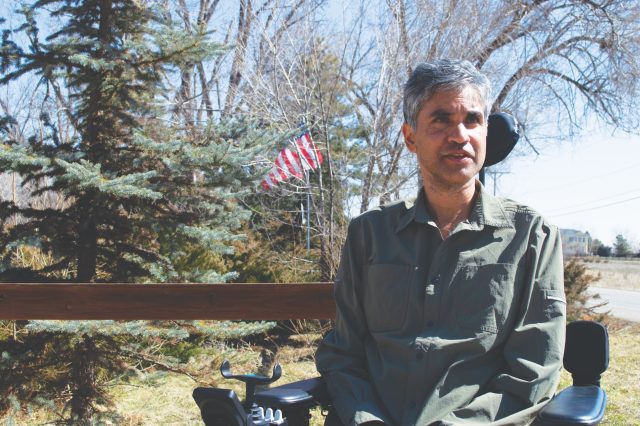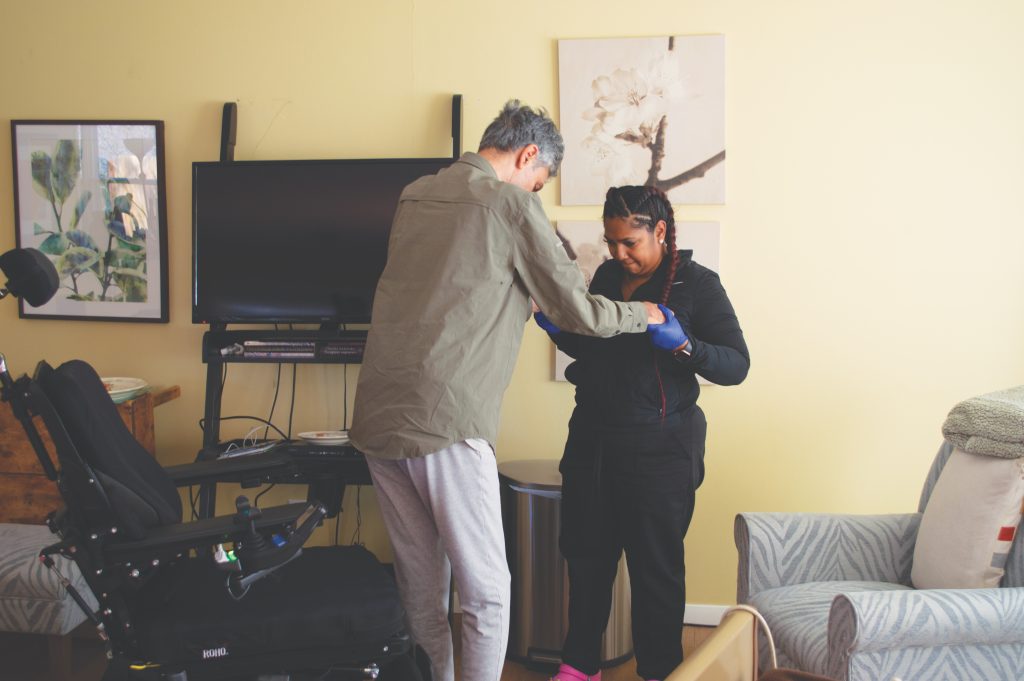
Syed Atif Ali (known as Atif) was halfway through a hike in Iceland when he started pushing the pace.
He wanted to run, like he often did on trails surrounding Boulder, where he received degrees from both CU and Naropa universities and has lived since the mid-2000s.
An avid outdoors person, Atif was driven to this two-week Icelandic adventure after his last long hike left him with an unexplainable feeling that he didn’t have many more hikes left.
But this time he was really struggling.
“Why can’t I run anymore?” he remembers thinking to himself during his hike.
When he fell and broke his ankle, he wasn’t surprised — just relieved.
Sprawled just off the trail surrounded by glaciers and mountain peaks, Atif thought he might finally know what was happening to his body.
“That [trip] was kind of my last hurrah,” he says during a visit to his rental home outside Lafayette.
A few years later, in September 2021, doctors at the Anschutz Medical Campus diagnosed Atif with Amyotrophic Lateral Sclerosis (ALS) and gave him a year and a half to live. Looking back, he says that fall on the hike in Iceland was a culmination of something he was feeling for some time — muscle weakness and problems with coordination leading him to feel insecure walking, crossing the street and running.
He says getting that diagnosis at 45 years old was devastating — he thought he was about halfway through his life.
The rare and life-threatening neurological disease, also known as Lou Gehrig’s disease, disrupts nerve cells that control voluntary muscle movements like walking, talking and breathing. The ALS Association estimates at least 16,000 people have the disease at a given time in the U.S. (two per 100,000 people).
Today, Atif struggles to lift his hand and arms, can’t stand without support, has difficulty talking and breathing, and requires a round-the-clock caregiver. He says the disease has progressed rapidly — just last November he was walking on his own.

He’s participated in multiple trials to test different treatments, but has not felt improvements. There’s no cure or effective treatment to reverse ALS’ progression.
Despite the physical, emotional and financial toll, Atif’s friends describe him as gracious, caring and strong.
His participation in the local arts and music scene around Boulder gave him a reputation as a popular “community guy” known to have “many orbits” of involvement in Boulder, including volunteering at local radio station KGNU.
Because of that reputation and his diagnosis, the community has been pouring out support for him over the last year and a half — with nearly 350 people donating a total of nearly $80,000 to help support him.
Chris Allred is a longtime friend of Atif’s. He says Atif has a “very strong spirit.”
“He’s facing this challenge with such fortitude and high spirits,” Allred says. “He’s just such a bright soul and he’s facing it better than I can imagine anyone doing with such a challenging diagnosis.”
Ongoing research
Despite first being discovered in 1869, there are still unknowns surrounding ALS.
According to the ALS Association, 10% of people with ALS inherit a mutated gene with a known connection to causing the disease. The other 90% of cases, including Atif’s, don’t have a definitive cause and are considered “sporadic.”
While it’s unclear how Atif developed ALS, he highlighted a brain injury caused by a car accident in 2016. On the outside it looked like he was recovering, he says, but on the inside it felt like “something had changed.”
“[The crash] took away a certain filter,” he says.
One study published in the National Library of Medicine in 2018 found trauma events confined to the head are risk factors for ALS.
Brian Frederick, senior vice president of communications at the ALS Association, says there are some diagnosis trends, like higher rates within certain occupations like military or NFL players or “clusters” of cases found in certain locations that could potentially point to an environmental cause. But, he reiterates that these are not definitive.
Frederick says the disease is hard to study because it affects people in different ways and along different timelines.
“We’re still trying to understand what causes ALS, so the lack of a clear, specific cause makes it more difficult to develop treatments,” he says.
Frederick, who received a Ph.D at CU, says he is seeing more resources invested in ALS research that is leading to new treatments and discoveries.
For example, in September 2022, the Food and Drug Administration (FDA) approved Relyvrio to treat patients with ALS. This is the first new treatment in “years,” according to Frederick. Another drug called Tofersen was under discussion during an FDA advisory committee meeting on March 22.
“We’re very hopeful that we’ll continue to see new treatments come online for a disease that hasn’t had a lot of treatments in the past,” says Frederick.
You’ve got a friend in me
Atif has family in Houston and Chicago, but one of the main reasons he came back to Boulder County was because of his friends. One of those friends is Allred, a sales rep at Boulder Weekly and former roommate of Atif’s.
On a sunny Friday at Atif’s place outside Lafayette, Allred arrives with home-baked cookies and purified water. The two of them used to go to CU’s International Film Series together and go on hikes at the Hessie Trailhead west of Nederland. They joke about how cold the house they lived in together on Goss Street always was.
Allred was one of the friends who answered Atif’s call in mid-February when he wanted to move out of the nursing home he was in because of “difficult conditions.”

“It was very hard to be in that space with my limited function,” Atif says. “I was relegated to a bed, and my decline happened very rapidly.”
Atif didn’t want to spend his last days there, so a crew of friends helped move him and his 400-lb electric-powered wheelchair to Lafayette.
While his new space is quieter and better fit for his needs, it presents challenges, like finding the money to pay for rent and home healthcare. While Atif’s support system is managing donation money, there’s concern it’s not sustainable without Medicaid support, which is estimated to arrive in up to two months.
Allred says all the support Atif has received from the community is a testament to his impact.
“It really shows the effect he’s had throughout his life because more and more friends and loved ones keep showing up to help,” Allred says.
Even Christy DeArment, who met Atif just this year through donating reiki sessions once a week, is touched by Atif.
“He’s a really amazing man and he impacts people when they meet him,” she says.
Atif has received Hospice care since December, when doctors gave him six months to live. Between now and the end, he doesn’t want to go back to a nursing home. For the rest of his time he says he is “trying to have a situation that allows the end stages to be comfortable, and with friends and community as much as possible.”
You can help Atif by donating to his GoFundMe. Learn more about ALS and ongoing research at als.org.














